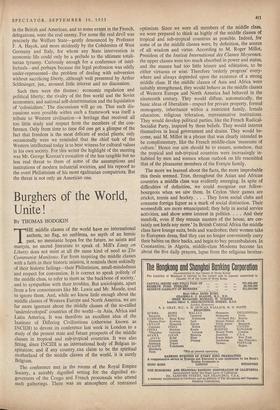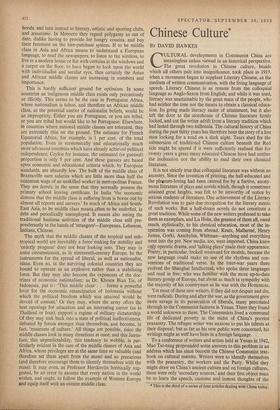Burghers of the World, Unite!
BY THOMAS HODGKIN THE middle classes of the world have no international anthem, no nag, no emblems, no myth of an heroic past, no messianic hopes for the future, no saints and martyrs, no sacred literature to speak of. Mill's Essay. on Liberty does not meet at all the same kind of need as The Communist Manifesto. Far from inspiring the middle classes with a faith in their historic mission, it reminds them unkindly of their historic failings—their Philistinism, small-mindedness ' and respect for convention. It is correct to speak politely of the middle class, to refer to them as 'the backbone of society,' and to sympathise with their troubles. But sociologists, apart from a few connoisseurs like Mr. Lewis and Mr. Maude, tend to ignore them. And, while we know little enough about the middle classes of Western Europe and North America, we are far more ignorant about the middle classes of the so-called 'underdeveloped' countries of the world—in Asia. Africa and Latin America. It was therefore an excellent idea of the Institute of Differing Civilisations (otherwise known as INCIDI) to devote its conference last week in London to a study of the present state and future prospects of the middle classes in tropical and sub-tropical countries. It was also fitting, since INCIDI is an international body of Belgian in- spiration; and if any country can claim to be the spiritual motherland of the middle classes of the world, it is surely Belgium.
The conference met in the rooms of the Royal Empire Society, a suitably dignified setting for the dignified ex- governors of the Congo and French proconsuls who attend' such gatherings. There was an atmosphere of restrained optimism. Since we were all members of the middle class, we were prepared to think as highly of the middle classes of tropical and sub-tropical countries as possible. Indeed, for some of us the middle classes were, by definition, the source of all wisdom and virtue. According to M. Roger Millot, President of the Institut International des Classes Moyennes, the upper classes were too much absorbed in power and status, and the masses had too little leisure and education, to be either virtuous or wise. Therefore 'orderly progress' every- where and always depended upon the existence of a strong .middle class. If the middle classes of Asia and Africa were suitably strengthened, they would behave as the middle classes of Western Europe and North America had behaved in the nineteenth century. They would diffuse, automatically, the basic ideas of liberalism—respect for private property, formal monogamy, inheritance within a restricted family, female education, religious toleration, representative institutions. They would develop political parties, like the French Radical- Socialist Party, inspired by these beliefs. They would interest themselves in local government and drains. They would be- come, said M. Millot in a phrase that was clearly intended to be complimentary, like the French middle-class 'museums of culture.' Hence our aim should be to ensure, somehow, that the tropical and sub-tropical countries were increasingly in- habited by men and women whose outlook on life resembled that of the pleasanter members of the Forsyte family.
The more we learned about the facts, the more improbable this thesis seemed. True, throughout the Asian and African countries a middle class was evidently emerging. In spite of difficulties of definition, we could recognise our fellow- bourgeois when we saw them. In Ceylon 'their games are cricket, tennis and hockey. . . . They form social clubs and consume foreign liquor as a mark of social distinction. Their womenfolk are more emancipated; they help in social service activities, and show some interest in politics. . . . And their menfolk, even if they remain masters of the house, are cer- tainly not lords any more.' In British Central Africa the middle class have lounge suits, beds and wardrobes; their women take to European dress, find they can no longer conveniently carry their babies on their backs, and begin to buy perambulators. In Constantine, in Algeria, middle-class Moslems become lax about the five daily prayers, lapse from the religious brother- hoods, and turn instead to literary, artistic and sporting clubs, and scoutisme. In Morocco they regard polygamy as out of date, dislike having to provide for hungry cousins, and buy their furniture on the hire-purchase system. If to be middle class in Asia and Africa means to understand a European language, to read the newspapers, to listen to the wireless, to live in a modern house or flat with curtains in the windows and a carpet on the floor, to have begun to look upon the world with individualist and secular eyes, then certainly the Asian and African middle classes are increasing in numbers and importance.
This is hardly sufficient ground for optimism. In some countries an indigenous middle class exists only precariously or illicitly. This seems to be the case in Portuguese Africa, where nationalism is taboo, and therefore an African middle class, as the potential carrier of nationalist beliefs, would be an impropriety. Either you are Portuguese, or you are tribal, or you are tribal but would like to be Portuguese. Elsewhere, 'in countries where national middle classes are tolerated, they are extremely thin on the ground. The estimate for French Equatorial Africa, for example, is 1 per cent. of the total population. Even in economically and educationally much more advanced countries which have already achieved political independence, Ceylon for instance, the estimated (or guessed) proportion is only 5 per cent. And these guesses are based upon economic and educational criteria which, by European standards, are absurdly low. The bulk of the middle class of Brazzaville earn salaries which are little more than half the minimum wage of an unskilled worker in metropolitan France. They are lettres, in the sense that they normally possess the primary school leaving certificate. In India 'the economic distress that the middle class is suffering from is borne out by almost all reports and surveys.' In much of Africa and South- East Asia, to be middle class means, often to be underfed, in debt and periodically unemployed. It means also seeing the traditional business activities of the middle class still pre- ponderantly in the hands of `strangers',—Europeans, Lebanese, Indians, Chinese.
The myth that the middle classes of the tropical and sub- tropical world are inevitably a force making for stability and 'orderly progress' does not bear looking into. They may in some circumstances, as in nineteenth-century Europe, be the instruments for the spread of liberal, as well as nationalist, ideas. Even so, in the surviving colonial countries they are bound to operate as an explosive rather than a stabilising force. But they may also become the exponents of the doc- trines of economic nationalism; as Dr. Khouw Bian Tie, of Indonesia. put it : 'This middle class . . . forms a powerful lever for the economic emancipation of Indonesia without which the political freedom which was attained would be devoid of content.' Or they may, where the army offers the best openings for education and an interesting career (as in Thailand or Iran), support a regime of military dictatorship. Of they may sink back into a state of political ineffectiveness, defeated by forces stronger than themselves, and become, in fact, 'museums of culture.' All things are possible, since the middle classes look in many directions at once; and this Janus- face, this unpredictability, this tendency to wobble, is par- ticularly evident in the case of the middle classes of Asia and Africa, whose privileges are at the same time so valuable (and therefore set them apart from the mass) and so precarious (and therefore encourage them to identify themselves with the mass). It may even, as Professor Herskovits heretically sug- gested, be an error to assume that every nation in the world wishes, and ought, to follow the example of Western Europe and equip itself with an outsize middle class.



































 Previous page
Previous page